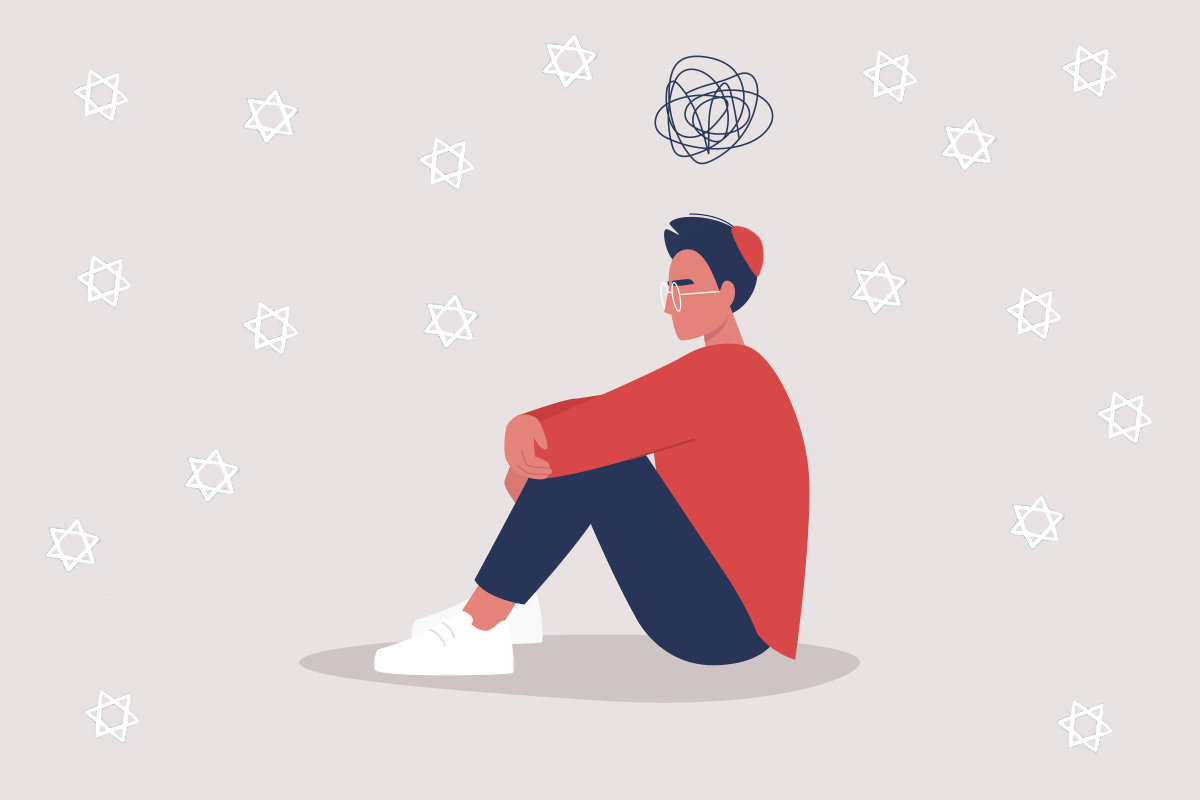Content warning: suicidal ideation
I live with bipolar disorder and major depressive disorder. As a rabbi, cantor, actor and author, that’s not how I usually introduce myself. But this summer I spent three and a half weeks at an in-patient facility tending to my mental health and that was how I usually identified myself.
Now, of course, each of us is larger than the sum of our parts. Our illnesses needn’t identify us nor do our failures. But for someone like myself, it felt so freeing to finally speak so honestly about being in such pain.
What’s ironic is that I’ve written openly before around my depression. I’ve strived to serve as an ally for members in my community who experience mental illness, creating support groups around their own wellness. As a rabbi, I’ve always felt it was my duty to ensure that everyone in my community felt comfortable talking about their mental health with me. But as many who live with mental illness know, our sickness is insidious and comes in waves. To make matters worse, I have not been vigilant in my own self-care; the past year of COVID-19 introduced a whole new level of loneliness and anxiety with all in-person gatherings pausing for the time being. And the bottom line was that I did not prioritize my mental health as I served others. I neglected it. I abused it.
To say I felt like a fraud or an imposter is an understatement. As a counselor, I constantly remind those who do seek my counsel just how precious they are, just how important their own self-care is. But here I was unable to admit just how much pain I was in, just how difficult it was for me to get out of bed in the morning, just how close to suicidal despair I was. It was far easier for me to tend to others’ broken hearts than it was to honor my own.
I am blessed with a family and a robust social network; why was it so hard for me to speak up and be honest around my own suffering? Social stigmas certainly played a role. Even though I had rabbis in rabbinical school tell me that if the rabbis of the Talmud were alive today, they would have instituted blessings to be said over antidepressants, I never felt fully comfortable talking about my own suffering with them. Perhaps, I thought, if I bolstered down, I could persevere. What complicated matters, in my particular case, was that I did not know I suffered from bipolar disorder, nor did my initial care providers.
Simply put: Bipolar disorder is a beast, and with the wrong medication it can make things much worse.
That happened to me, and it was a terrifying place to live, not being able to experience the joys in my that were so abundantly apparent to others, and even to myself sometimes. I lived regularly with high highs and low lows, with little to no sleep, with mania, confusion and torment mixed in. And because I like to think I’m a half-decent actor, coupled with my own shame of sharing, many people did not notice.
Fortunately, I have been on a new medication for the past couple of months and it feels strange to admit this, but I feel cautiously optimistic — and even hopeful — as it reaches its therapeutic dose. I know bipolar disorder is heavily researched and treatable, and finally, I feel like I am reaping the benefits of that scientific research. It is because of this, because that dark cloud has seemingly lifted and because I was in such a dark place of depression, that I feel compelled to write about it now, openly, with the gloves off.
The way we battle stigmas is by talking about them — this much I know and it is important to remember. But that’s not the only reason why I am choosing to share publicly now. I share my experience now because I know there are so many others out there who, like me, are suffering in silence, who may contemplate suicide, who are at the darkest points of near despair.
I write this to you to let you know: I am like you. And to tell you: You are never alone. And I promise you, as many a friend and counselor promised me, it gets better. It is not immediate. It is not as quick and painless as we might want or need it to be. And there is not a one-size-fits-all solution. But through therapy, through medicine, and through open channels of communication, you can survive and thrive.
One final note: I want to state the obvious, something I learned the hard way. If your physical vision wasn’t allowing you to see clearly or easily, wouldn’t you say something? If your stomach was causing you physical harm, wouldn’t you seek to get well? In 2021, we ought be able to speak this way of our own mental illnesses without fear and judgment. So, if this piece has moved or inspired you in any way, and if you struggle with these illnesses in your own way, please do the world a favor and share that. Share it privately. Share it publicly. Share it on the rooftops. Or whisper it to just one friend.
It is only when we can name and face our hurt that we can possibly even begin to repair. As Rebbe Nachman of Bratzlav taught us centuries ago, “If you believe you have the capacity to destroy, believe you have the capacity to repair.”



